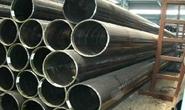Prices

February 26, 2017
Trump: Pipeline Projects Must Use U.S. Produced Steel
Written by Sandy Williams
President Donald Trump says the Keystone and Dakota Access pipelines must be built from American manufactured steel. After playing with semantics for weeks, the President has now issued a mandate that will require the Keystone XL and Dakota Access pipelines to use steel pipe manufactured in the U.S., according to a report by CNBC on Thursday.
![]() “And you’re going to be doing pipelines now, you know that, right?” Trump told US Steel CEO Mario Longhi during a meeting of business leaders at the White House.
“And you’re going to be doing pipelines now, you know that, right?” Trump told US Steel CEO Mario Longhi during a meeting of business leaders at the White House.
“We put you heavy into the pipeline business because we approved, as you know, the Keystone pipeline and Dakota, but they have to buy, meaning steel, so I’ll say U.S. steel, but steel made in this country and pipelines made in this country.”
The requirement is not expected to be a significant problem for the Dakota Access pipeline since it mostly completed. Requiring a Canadian company to discard already manufactured and purchased pipe to comply with the mandate is another matter.
TransCanada has made it clear that 50 percent of the pipe for Keystone XL will come from the Welspun plant in Arkansas but the rest will be pipe that was manufactured in Canada, Italy and India. TransCanada has not yet commented on the mandate. Although memos have been signed to push the projects forward, the Commerce Department has not issued a formal report yet.
In a speech in January to Republican lawmakers, Trump talked about “huge” the pipes are and how difficult it is to get them to the Midwestern United States from foreign countries.
“These are big pipes. Now, the only way I can imagine they [ship them] is they must have to cut them. Because they’re so big, I can’t imagine — they take up so much room — I can’t imagine you could put that much pipe on ships. It’s not enough. It’s not long enough,” he said.
“So I assume they have to fabricate and cut, which hurts the pipe, by the way,” he said.
Pipe is not cut up for shipment and is typically fabricated in 40 foot lengths, said John Stoody, a spokesperson for the Association of Oil Pipelines. “The historic safety issue with shipping pipe, and this applies to any mode — truck, train or ship — is making sure the pipes are supported along the entire length. If they are supported just on the ends, then the middles can flex, and that puts strain on the metal,” he said.
Trump also said he would pressure companies to comply by refusing to exercise eminent domain to gain lands that the pipelines would traverse.
“If we’re going to use our powers of eminent domain and all the other powers, then I want the pipe to be manufactured with United States steel,” said Trump.
Dan Ikenson, director of the Cato Institute’s Herbert A Steifel Center for Trade Policy Studies said there is no legal authority for the government to require a private company to use domestic materials.
Said Ikensen, “Is it good policy to have the president dictate where U.S. companies buy their inputs? No. I think that’s terrible. I think that’s dictatorial. I think it’s very bad precedence.”
Mario Longhi, in a CNBC interview earlier this month, said, “The American manufacturing base on steel is fully prepared to supply what is needed for the pipelines and for the general infrastructure projects that are certainly going to come.”
Longhi repeated that sentiment in an interview on Thursday with CNBC, “The capability is in there for us to make everything that is needed,” Longhi said. “We are going to become energy dependent not too far down the road. Therefore, the capacity to explore, produce, extract and transmit is something that our industry is capable of delivering.”







